
The global warming controversy concerns the public debate over whether global warming is occurring, how much has occurred in modern times, what has caused it, what its effects will be, whether any action can or should be taken to curb it, and if so what that action should be. In the scientific literature, there is a strong consensus that global surface temperatures have increased in recent decades and that the trend is caused by human-induced emissions of greenhouse gases. No scientific body of national or international standing disagrees with this view, though a few organizations with members in extractive industries hold non-committal positions, and some have tried to persuade the public that climate change is not happening, or if the climate is changing it is not because of human influence, attempting to sow doubt in the scientific consensus.

There is a strong scientific consensus that the Earth is warming and that this warming is mainly caused by human activities. This consensus is supported by various studies of scientists' opinions and by position statements of scientific organizations, many of which explicitly agree with the Intergovernmental Panel on Climate Change (IPCC) synthesis reports.
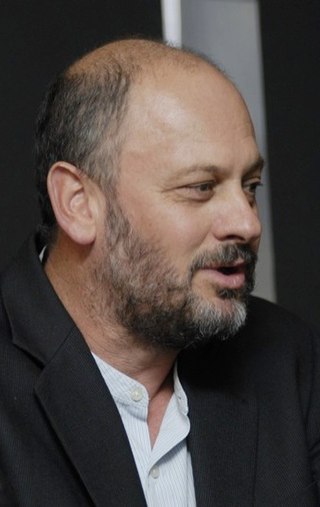
Timothy Fridtjof Flannery is an Australian mammalogist, palaeontologist, environmentalist, conservationist, explorer, author, science communicator, activist and public scientist. He was awarded Australian of the Year in 2007 for his work and advocacy on environmental issues.

The Carbon Pollution Reduction Scheme was a cap-and-trade emissions trading scheme for anthropogenic greenhouse gases proposed by the Rudd government, as part of its climate change policy, which had been due to commence in Australia in 2010. It marked a major change in the energy policy of Australia. The policy began to be formulated in April 2007, when the federal Labor Party was in Opposition and the six Labor-controlled states commissioned an independent review on energy policy, the Garnaut Climate Change Review, which published a number of reports. After Labor won the 2007 federal election and formed government, it published a Green Paper on climate change for discussion and comment. The Federal Treasury then modelled some of the financial and economic impacts of the proposed CPRS scheme.
Post-Kyoto negotiations refers to high level talks attempting to address global warming by limiting greenhouse gas emissions. Generally part of the United Nations Framework Convention on Climate Change (UNFCCC), these talks concern the period after the first "commitment period" of the Kyoto Protocol, which expired at the end of 2012. Negotiations have been mandated by the adoption of the Bali Road Map and Decision 1/CP.13.
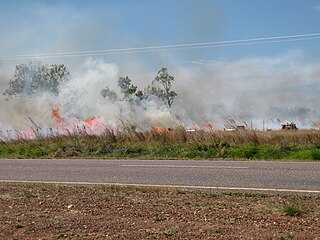
Climate change in Australia has been a critical issue since the beginning of the 21st century. Australia is becoming hotter and more prone to extreme heat, bushfires, droughts, floods, and longer fire seasons because of climate change. Since the beginning of the 20th century, Australia has experienced an increase of over 1.4 °C in average annual temperatures, with warming occurring at twice the rate over the past 50 years as in the previous 50 years. Recent climate events such as extremely high temperatures and widespread drought have focused government and public attention on the effects of climate change in Australia. Rainfall in southwestern Australia has decreased by 10–20% since the 1970s, while southeastern Australia has also experienced a moderate decline since the 1990s. Rainfall is expected to become heavier and more infrequent, as well as more common in summer rather than in winter. Water sources in the southeastern areas of Australia have depleted due to the increasing population in urban areas coupled with a persistent prolonged drought.

Professor Ross Garnaut led two climate change reviews, the first commencing in 2007 and the second in 2010.

Emission trading (ETS) for carbon dioxide (CO2) and other greenhouse gases (GHG) is a form of carbon pricing; also known as cap and trade (CAT) or carbon pricing. It is an approach to limit climate change by creating a market with limited allowances for emissions. This can lower competitiveness of fossil fuels and accelerate investments into low carbon sources of energy such as wind power and photovoltaics. Fossil fuels are the main driver for climate change. They account for 89% of all CO2 emissions and 68% of all GHG emissions.
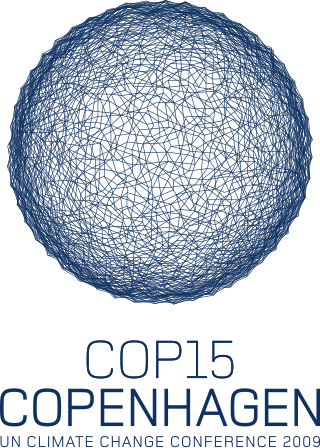
The 2009 United Nations Climate Change Conference, commonly known as the Copenhagen Summit, was held at the Bella Center in Copenhagen, Denmark, between 7 and 18 December. The conference included the 15th session of the Conference of the Parties to the United Nations Framework Convention on Climate Change (UNFCCC) and the 5th session of the Conference of the Parties serving as the meeting of the Parties to the Kyoto Protocol. According to the Bali Road Map, a framework for climate change mitigation beyond 2012 was to be agreed there.

Canada was active in the negotiations that led to the Kyoto Protocol in 1997. The Liberal government that signed the accord in 1997 ratified it in parliament in 2002. Canada's Kyoto target was a 6% total reduction in greenhouse gas (GHG) emissions by 2012, compared to 1990 levels of 461 megatonnes (Mt). Despite signing the accord, greenhouse gas emissions increased approximately 24.1% between 1990 and 2008. In 2011, Conservative Prime Minister Stephen Harper withdrew Canada from the Kyoto Protocol.
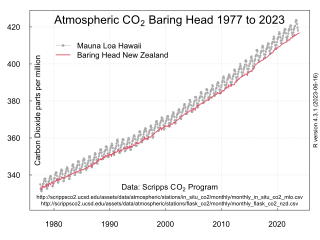
Climate change in New Zealand involves historical, current and future changes in the climate of New Zealand; and New Zealand's contribution and response to global climate change. Summers are becoming longer and hotter, and some glaciers have melted completely and others have shrunk. In 2021, the Ministry for the Environment estimated that New Zealand's gross emissions were 0.17% of the world's total gross greenhouse gas emissions. However, on a per capita basis, New Zealand is a significant emitter, the sixth highest within the Annex I countries, whereas on absolute gross emissions New Zealand is ranked as the 24th highest emitter.
Greenhouse gas emissions by Australia totalled 533 million tonnes CO2-equivalent based on greenhouse gas national inventory report data for 2019; representing per capita CO2e emissions of 21 tons, three times the global average. Coal was responsible for 30% of emissions. The national Greenhouse Gas Inventory estimates for the year to March 2021 were 494.2 million tonnes, which is 27.8 million tonnes, or 5.3%, lower than the previous year. It is 20.8% lower than in 2005. According to the government, the result reflects the decrease in transport emissions due to COVID-19 pandemic restrictions, reduced fugitive emissions, and reductions in emissions from electricity; however, there were increased greenhouse gas emissions from the land and agriculture sectors.

The 2010 United Nations Climate Change Conference was held in Cancún, Mexico, from 29 November to 10 December 2010. The conference is officially referred to as the 16th session of the Conference of the Parties (COP 16) to the United Nations Framework Convention on Climate Change (UNFCCC) and the 6th session of the Conference of the Parties serving as the meeting of the Parties (CMP 6) to the Kyoto Protocol. In addition, the two permanent subsidiary bodies of the UNFCCC — the Subsidiary Body for Scientific and Technological Advice (SBSTA) and the Subsidiary Body for Implementation (SBI) — held their 33rd sessions. The 2009 United Nations Climate Change Conference extended the mandates of the two temporary subsidiary bodies, the Ad Hoc Working Group on Further Commitments for Annex I Parties under the Kyoto Protocol (AWG-KP) and the Ad Hoc Working Group on Long-term Cooperative Action under the Convention (AWG-LCA), and they met as well.
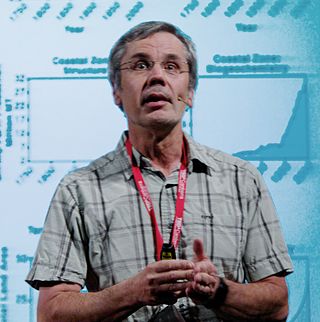
William Lee Steffen was an American-born Australian chemist. He was the executive director of the Australian National University (ANU) Climate Change Institute and a member of the Australian Climate Commission until its dissolution in September 2013. From 1998 to 2004, he was the executive director of the International Geosphere-Biosphere Programme, a coordinating body of national environmental change organisations based in Stockholm. Steffen was one of the founding climate councillors of the Climate Council, with whom he frequently co-authored reports, and spoke in the media on issues relating to climate change and renewable energy.

The Clean Energy Act 2011 was an Act of the Australian Parliament, the main Act in a package of legislation that established an Australian emissions trading scheme (ETS), to be preceded by a three-year period of fixed carbon pricing in Australia designed to reduce carbon dioxide emissions as part of efforts to combat global warming.
A carbon pricing scheme in Australia was introduced by the Gillard Labor minority government in 2011 as the Clean Energy Act 2011 which came into effect on 1 July 2012. Emissions from companies subject to the scheme dropped 7% upon its introduction. As a result of being in place for such a short time, and because the then Opposition leader Tony Abbott indicated he intended to repeal "the carbon tax", regulated organizations responded rather weakly, with very few investments in emissions reductions being made. The scheme was repealed on 17 July 2014, backdated to 1 July 2014. In its place the Abbott Government set up the Emission Reduction Fund in December 2014. Emissions thereafter resumed their growth evident before the tax.

The Climate Change Authority (CCA) is an Australian Government statutory agency responsible for providing independent advice to government on climate change policy. It was established by and operates under the Climate Change Authority Act 2011. The Authority commenced operations on 1 July 2012. It was setup by Julia Gillard and has withstood concerted efforts for its disestablishment. The Abbott Government campaigned for the CCA's abolishment, having successfully abolished the Climate Commission.

The Climate Council is Australia's leading climate change communications non-profit organisation formed to provide independent, authoritative information on climate change and its solutions to the Australian public. It advocates reducing greenhouse gas emissions. It was created by former members of the Climate Commission after it was abolished by the Abbott government in 2013. It is funded by donations from the public.
The history of climate change policy and politics refers to the continuing history of political actions, policies, trends, controversies and activist efforts as they pertain to the issue of global warming and other environmental anomalies. Dryzek, Norgaard, and Schlosberg suggest that critical reflection on the history of climate policy is necessary because it provides 'ways to think about one of the most difficult issues we human beings have brought upon ourselves in our short life on the planet’.

Sustainable Development Goal 13 is about climate action and protecting Life. It is one of 17 Sustainable Development Goals established by the United Nations General Assembly in 2015. The official mission statement of this goal is to "Take urgent action to combat climate change and its impacts". SDG 13 has five targets which are to be achieved by 2030. They cover a wide range of issues surrounding climate action. The first three targets are "output targets": Strengthen resilience and adaptive capacity to climate-related disasters; integrate climate change measures into policies and planning; build knowledge and capacity to meet climate change. The remaining two targets are "means of achieving" targets: To implement the UN Framework Convention on Climate Change, and to promote mechanisms to raise capacity for planning and management. Along with each target, there are “indicators” that provide a method to review the overall progress of each target, along with SDG 13 as a whole. The United Nations Framework Convention on Climate Change (UNFCCC) is the primary international, intergovernmental forum for negotiating the global response to climate change.















